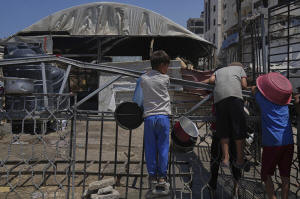UN food agency chief says women and children are starving in Gaza and
pressed Netanyahu on aid
[August 29, 2025]
By SAM MEDNICK and SAMY MAGDY
TEL AVIV, Israel (AP) — The head of the U.N. food agency said Thursday
that it was “very evident” during her visit to Gaza this week that there
isn't enough food in the Palestinian territory and that she spoke with
Israeli Prime Minister Benjamin Netanyahu about the urgent need for more
aid.
The world’s leading authority on food crises said last week the Gaza
Strip’s largest city is gripped by famine, and that it was likely to
spread across the territory without a ceasefire and an end to
restrictions on humanitarian aid.
Cindy McCain, the World Food Program's executive director, told The
Associated Press that starvation was underway in Gaza.
“I personally met mothers and children who were starving in Gaza," she
said. "It is real and it is happening now,”
Netanyahu, she said, was “obviously very concerned that people aren’t
getting enough food.” In the past, he has denied that there is famine in
Gaza and said the claims about starvation are a propaganda campaign
launched by Hamas.
“We agreed that we must immediately redouble our efforts to get more
humanitarian aid in. Access and security for our convoys is critical,”
McCain said.
Pressure on Israel
The famine declaration has increased international pressure on Israel,
which has been fighting Hamas since the militant group’s deadly Oct. 7,
2023, attack. Israel now says it plans to seize Gaza City and other
Hamas strongholds, and there have been no public signs of progress on
recent efforts for a ceasefire.

Israel rejects the declaration — issued by the authority on food crises
known as the Integrated Food Security Phase Classification, or IPC — and
on Wednesday asked for a formal retraction.
The Israeli military agency in charge of transferring aid to the
territory, known as COGAT, said Thursday that more than 300 humanitarian
aid trucks enter Gaza every day, most of them carrying food.
But aid groups say it’s not nearly enough after 22 months of fighting,
the blockade of aid earlier this year and the collapse of food
production in Gaza. McCain spent most of Tuesday on a tour of Gaza
speaking to displaced families living in tents and facing hunger.
“I got to meet a family who had come from the North, there were 11 of
them, and they’d come from the North and they literally had not had
enough food at all and they still don’t have enough food," she said.
McCain said her program is getting more food in to Gaza, but said a
surge in food supplies was needed.
'A present-day catastrophe'
U.N. Secretary-General Antonio Guterres said famine in Gaza is “a
present-day catastrophe" and the start of expanded Israeli military
operations present “a new and dangerous phase.”
He said it will have “devastating consequences" and force hundreds of
thousands of traumatized and exhausted civilians to flee again.
[to top of second column]
|

A Palestinian children wait at a community kitchen before donated
food is prepared and distributed in Gaza City, Friday, Aug. 22,
2025. (AP Photo/Abdel Kareem Hana)

“Gaza is piled with rubble, piled with bodies, and piled with examples
of what may be serious violations of international law,” he said.
Mediators Egypt and Qatar were still waiting for Israel’s response to a
60-day ceasefire proposal in Gaza, which has been accepted by Hamas,
Qatari foreign minister said Thursday.
The proposal, which Egyptian and Qatari mediators delivered to Israel
earlier this month, calls for a 60-day ceasefire in exchange for the
release of 10 living hostages and the handover of bodies of 18 dead
ones, according to Arab mediators. It also calls for the withdrawal of
Israeli forces to a buffer zone on Gaza.
Exchanges with Yemen's Houthi rebels
Also Thursday, Israeli airstrikes hit the Yemeni capital, Sanaa, in
response to attacks by the Arab country's Iran-backed Houthi rebels, who
have launched missiles and drones toward Israel and targeted ships in
the Red Sea for over 22 months. The Houthis say the attacks are in
solidarity with Palestinians.
Nearly 63,000 people have been killed in Gaza since the war began,
according to the Palestinian Health Ministry in Gaza. The agency
reported that 71 people were killed by Israeli strikes over the past
day, while scores more were injured. While the ministry does not
differentiate between civilians and combatants, it says more than half
of the dead were women and children.
The ministry is part of the Hamas-run government and staffed by medical
professionals. The United Nations and independent experts consider it
the most reliable source on war casualties. Israel disputes its figures
but has not provided its own.
Hamas-led militants abducted 251 people and killed around 1,200 people,
mostly civilians, in the Oct. 7, 2023, attack that triggered the war.
Most of the hostages have been released in ceasefires or other deals. Of
the 50 remaining in Gaza, Israel believes around 20 are alive.

The U.N. chief said Israel, as the occupying power, has obligations to
protect civilians, facilitate far greater humanitarian access and meet
their essential needs.
The systematic dismantling of systems that provide food water and
healthcare, Guterres said, “are the result of deliberate decisions that
defy basic humanity.”
___
Magdy reported from Cairo. Associated Press writers Melanie Lidman in
Jerusalem, Edith M. Lederer at the United Nations and Maryclaire Dale in
Philadelphia contributed to this report.
All contents © copyright 2025 Associated Press. All rights reserved |